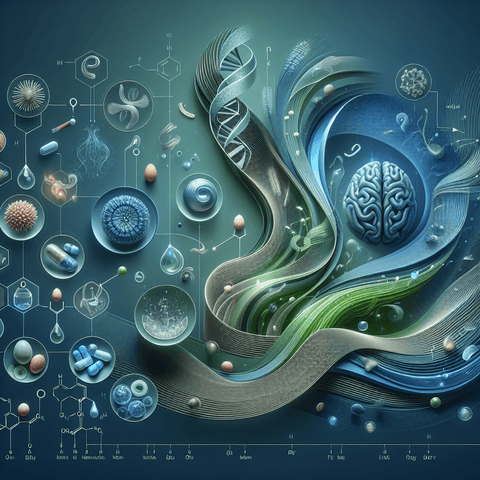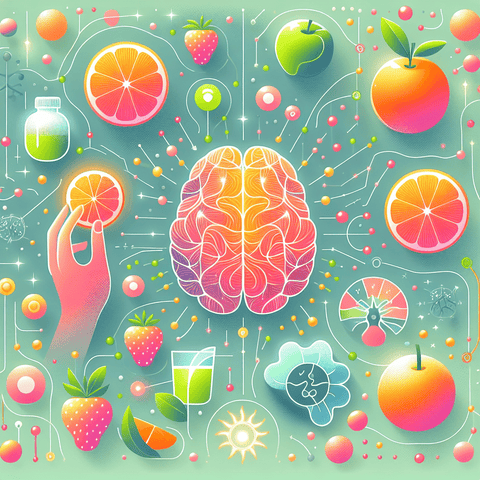Introduction: The Vital Role of Vitamin B12 in Overall Health and Hormone Regulation
In our complex biological systems, nutrients play a fundamental role in maintaining health, vitality, and optimal functioning. Among these, vitamins are essential micronutrients that support a myriad of physiological processes, including immune function, energy production, neurological health, and hormonal balance. While many are familiar with vitamins like C and D, vitamin B12 often remains underappreciated despite its vital contributions to our well-being.
Vitamin B12, also known as cobalamin, is critical for DNA synthesis, red blood cell formation, neurological function, and methylation reactions. Its influence extends beyond basic cellular processes, intricately connecting with hormone regulation through multiple biochemical pathways. Understanding these connections opens new avenues to optimize health by supporting hormone balance naturally.
This article explores how vitamin B12 influences hormone regulation through pathways such as homocysteine management, methylation cycles, neurological health, energy metabolism, and red blood cell production. By unlocking these hidden links, individuals can harness the full potential of B12 to enhance overall vitality and hormonal harmony.
Understanding Vitamin B12 and Its Role in Nutritional Supplements
Vitamin B12 is a water-soluble vitamin primarily found in animal products such as meat, fish, eggs, and dairy. It is essential for normal cellular function, growth, and development. Due to its unique absorption process involving intrinsic factor in the stomach, deficiency can often occur in individuals with gastrointestinal conditions, vegans, vegetarians, or those with malabsorption issues. To ensure adequate levels, supplementation becomes often necessary.
Common forms of vitamin B12 used in supplements include cyanocobalamin and methylcobalamin. Cyanocobalamin is a synthetic form known for stability and affordability, while methylcobalamin is the bioactive form directly usable by the body. Both are effective, but methylcobalamin is often preferred for neurological support and methylation support.
Supplementation plays a crucial role in maintaining optimal B12 levels, especially when dietary intake is insufficient or absorption is impaired. Adequate B12 supports not only neurological and hematological health but also plays an essential role in hormonal health by participating in methylation processes that regulate hormone synthesis and detoxification.
Moreover, B12 does not work in isolation; its interaction with other nutrients such as folate, vitamin D, and magnesium can influence its effectiveness and the overall hormonal balance. For instance, combining B12 with methylated folate enhances methylation capacity, critical for hormone production and regulation.
To explore a comprehensive range of B12 supplements, visit Topvitamine’s Vitamin B12 collection. Maintaining adequate B12 levels is a foundational step toward promoting hormonal health and overall vitality.
Homocysteine Regulation: Connecting Vitamin B12 to Cardiovascular and Hormonal Wellness
Homocysteine is an amino acid produced during methionine metabolism, and elevated levels are associated with increased risk of cardiovascular disease. However, homocysteine also influences hormonal health by affecting endothelial function and promoting inflammation, both of which can disrupt endocrine balance. It is considered a critical biomarker for holistic health management.
Vitamin B12 plays a pivotal role as a co-factor in the remethylation of homocysteine to methionine, a process that helps regulate homocysteine levels. When B12 levels are adequate, homocysteine is efficiently converted, preventing its accumulation and minimizing its adverse effects on cardiovascular function and hormone systems.
Research indicates that elevated homocysteine levels can interfere with hormone secretion, particularly stress hormones like cortisol and reproductive hormones such as estrogen and testosterone, through mechanisms involving inflammation and oxidative stress. These disruptions may contribute to hormonal imbalances leading to symptoms like fatigue, mood swings, and reproductive issues.
To maintain hormonal harmony, managing homocysteine levels is critical. Ensuring sufficient intake of B12 through diet or supplementation is a straightforward nutritional strategy. Foods rich in B12 provide the raw materials necessary for supporting methylation pathways.
For individuals interested in optimizing B12 intake, high-quality supplements can be an effective tool. Exploring options at Topvitamine’s Vitamin D collection can complement the action of B12, as vitamin D also plays a role in cardiovascular and hormonal health.
The Methylation Process: How Vitamin B12 Supports Hormone Synthesis and Detoxification
Methylation is a fundamental biochemical process that involves transferring methyl groups (–CH3) to various molecules, including DNA, proteins, and hormones. This process regulates gene expression, detoxification pathways, and hormone production, making it indispensable for maintaining hormonal balance and overall health.
Vitamin B12 is a key co-factor in the methylation cycle, working closely with folate to generate methyl groups necessary for methylation reactions. Proper methylation ensures the synthesis of crucial hormones such as estrogen, progesterone, testosterone, and cortisol. These hormones control reproductive health, stress response, metabolic rate, and mood regulation.
Deficits in B12 can impair methylation efficiency, leading to disrupted hormone synthesis and imbalances. Symptoms may include menstrual irregularities, decreased libido, fatigue, and mood disturbances. Moreover, compromised methylation hampers detoxification pathways, resulting in the accumulation of toxins that further disrupt endocrine function.
Supplementation with methylated forms of B12 and folate can markedly improve methylation capacity. This, in turn, promotes balanced hormone production and enhances the body’s ability to detoxify, supporting long-term hormonal health.
To support your methylation cycle, consider integrating [methylcobalamin](https://www.topvitamine.com/collections/vitamin-b12-benefits) into your supplement regimen. Proper methylation not only benefits hormone synthesis but also protects your DNA and cells from oxidative damage, fostering overall wellness.
Neurological Health: The Link Between Vitamin B12, Mood, and Hormonal Regulation
The neurological system acts as a bridge between mental health and hormonal regulation. Neurotransmitters such as serotonin, dopamine, and norepinephrine influence mood, stress response, and reproductive health. Vitamin B12 is vital for maintaining nerve function and neurotransmitter synthesis, thereby indirectly supporting hormonal stability.
B12 deficiency is linked to neurological issues such as numbness, tingling, cognitive decline, and mood disorders like depression and anxiety. These conditions often correlate with altered levels of stress hormones like cortisol and imbalance in reproductive hormones.
Research indicates that adequate B12 levels contribute to consistent neurotransmitter production, supporting mood stabilization and reducing stress. Since chronic stress influences cortisol levels—often leading to hormonal imbalance—supporting neurological health becomes a crucial aspect of hormonal harmony.
Ensuring sufficient B12 intake through diet and supplements can help alleviate mood swings, improve cognitive function, and stabilize stress hormones. For nervous system support, [DHA/EPA Omega-3 supplements](https://www.topvitamine.com/collections/dha-epa-omega-3-supplements) are also recommended due to their neuroprotective effects.
Addressing neurological health enhances the body’s capacity to regulate hormones naturally, leading to improved energy, mood, and overall vitality.
Energy Metabolism: Unlocking Vitality Through Vitamin B12 for Hormonal Balance
Energy production at the cellular level is foundational to hormonal health. Mitochondria, the powerhouses of cells, depend on various nutrients, including vitamin B12, to produce ATP—the energy currency vital for all bodily functions. Adequate energy levels influence hormonal secretion from glands such as the thyroid, adrenal, and reproductive organs.
Vitamin B12 is highly involved in mitochondrial function and the conversion of food into usable energy. A deficiency can result in fatigue, weakness, and poor metabolic rate—all of which negatively impact hormone regulation.
Thyroid hormones, like thyroxine (T4) and triiodothyronine (T3), are central regulators of metabolism and influence energy balance. B12 deficiency can impair thyroid function, leading to symptoms such as weight gain, sluggishness, and hormonal imbalance.
Recognizing signs of B12 deficiency is critical. These include persistent fatigue, neurological symptoms, and difficulty concentrating. Incorporating bioavailable B12 supplements into your diet can revitalize energy levels and support key hormonal pathways.
For boosting energy and hormonal harmony, high-quality [Magnesium](https://www.topvitamine.com/collections/magnesium-benefits-energy-muscle-bone-support) supplements are also beneficial, as magnesium is essential for over 300 enzymatic reactions, including those involved in hormonal synthesis.
Red Blood Cell Production: Ensuring Adequate Oxygen Delivery and Hormonal Harmony
Red blood cells (RBCs) are responsible for transporting oxygen from the lungs to tissues, including hormone-producing glands. Vitamin B12 is essential for erythropoiesis—the process of red blood cell formation. Without adequate B12, the body develops megaloblastic anemia characterized by large, immature RBCs that impair oxygen delivery.
Impaired oxygen transport can affect cellular health and metabolic processes, including hormone synthesis. Cells require oxygen to produce energy and synthesize hormones like cortisol, estrogen, and testosterone efficiently.
Addressing B12 deficiency restores healthy RBC production, improves oxygenation, and promotes systemic and hormonal balance. Early detection and nutritional interventions are crucial to prevent long-term systemic and hormonal disruptions.
Explore options to optimize red blood cell health through supplementation via Topvitamine’s B12 collection. Combined with nutrients like iron, folate, and vitamin K, B12 supports a holistic approach to vascular and hormonal health.
Conclusion: Integrating Vitamin B12 Supplementation into Your Hormonal Health Regimen
In summary, vitamin B12 is a central player in integrating multiple pathways that support hormonal health—from homocysteine regulation and methylation to neurological support and energy metabolism. Ensuring optimal B12 levels allows your body to produce, detoxify, and regulate hormones effectively, promoting overall wellness and vitality.
Personalized supplementation, tailored to your unique needs and guided by healthcare professionals, can help unlock these health benefits. Incorporating B12-rich foods and considering high-quality supplements can serve as a robust foundation for hormonal harmony and systemic health.
By understanding these interconnected pathways, you empower yourself with knowledge to make informed choices that enhance your well-being. Embrace the potential of vitamin B12 to help unlock your body's natural capacity for balance and vitality.
Q&A Section
Q: How does vitamin B12 influence hormone production?
A: B12 is essential for methylation processes that regulate gene expression and hormone synthesis. It supports the production of reproductive hormones like estrogen and testosterone while helping manage stress hormones such as cortisol. Proper B12 levels ensure efficient synthesis and detoxification, maintaining hormonal balance.
Q: Can B12 deficiency lead to hormonal imbalances?
A: Yes, deficiency can impair methylation and neurological health, both of which influence hormone regulation. Symptoms may include fatigue, mood swings, reproductive issues, and metabolic slowdown, all indicative of hormonal imbalance.
Q: What are the best ways to ensure adequate B12 levels?
A: Dietary intake from animal products is primary, but supplements such as methylcobalamin are highly effective, especially for those with absorption issues. Consulting healthcare professionals for personalized recommendations is advisable.
Q: How does homocysteine impact hormone health?
A: Elevated homocysteine can cause inflammation and oxidative stress, disrupting endothelial function and interfering with hormone secretion, notably cortisol, estrogen, and testosterone. Managing B12 levels helps keep homocysteine in check, supporting hormonal balance.
Q: What other nutrients complement B12 in supporting hormonal health?
A: Folate (preferably methylated), vitamin D, magnesium, and omega-3 fatty acids are key nutrients that work synergistically with B12 to support hormonal synthesis, regulation, and overall systemic health.
Important Keywords
- Vitamin B12
- Hormone balance
- Methylation
- Homocysteine regulation
- Neurological health
- Energy metabolism
- Red blood cell production
- Supplementation
- Hormonal health
- Systemic wellness



